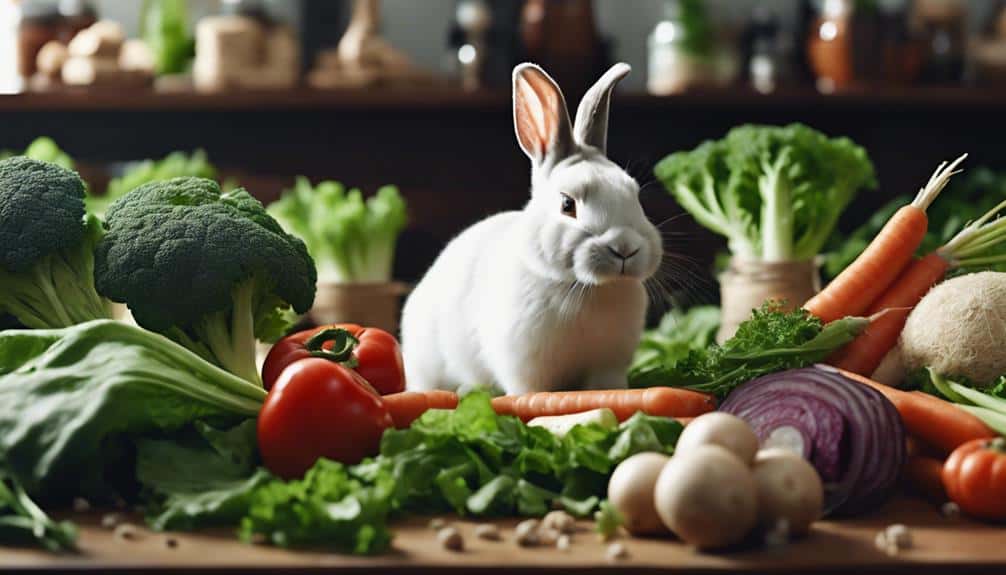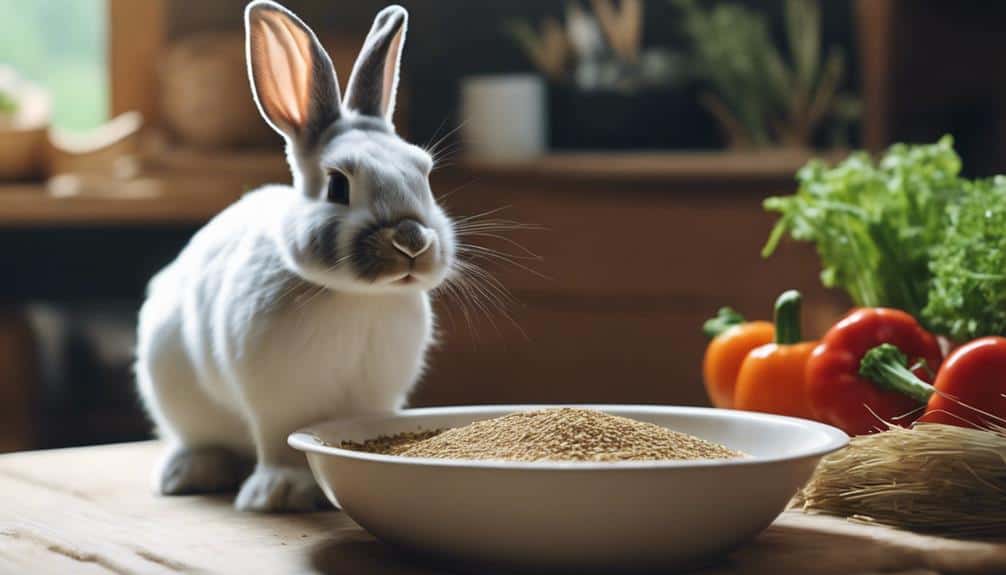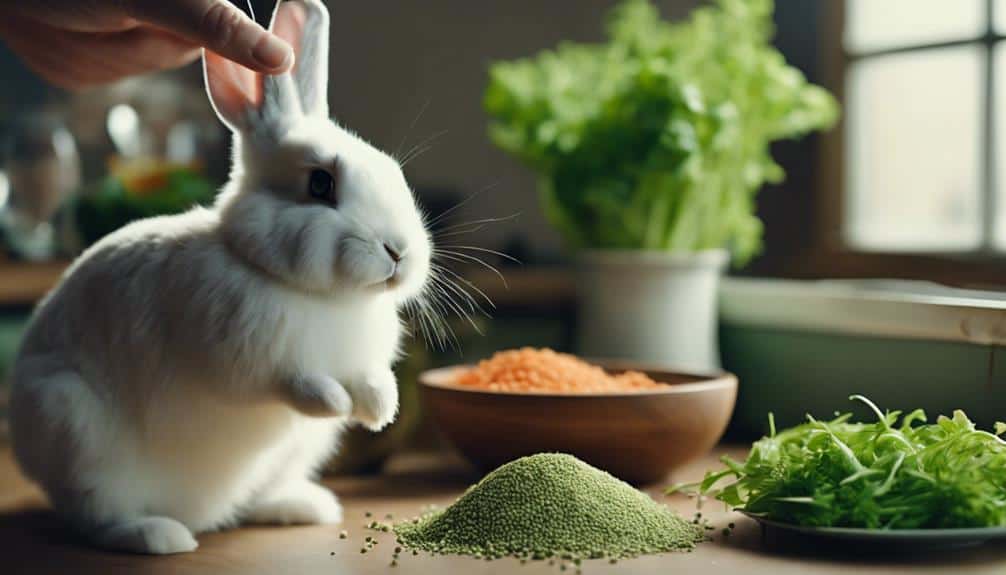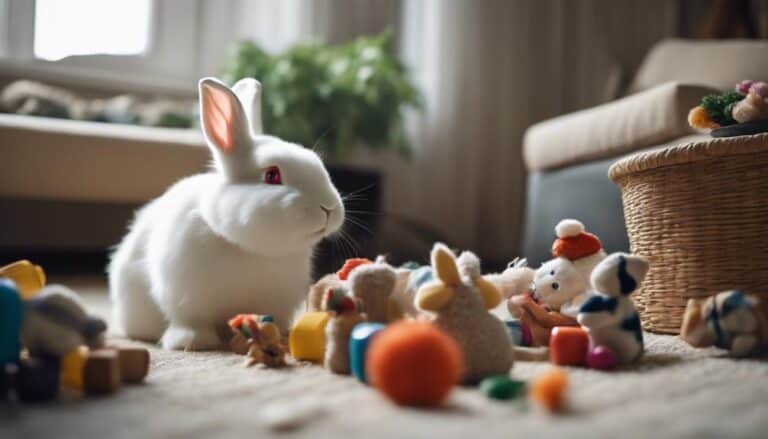If you want your bunnies to gain weight safely, make sure they eat mostly hay every day, around 85%. Mix in some leafy greens, vegetables, and just a few pellets.
As for treats, give them things like raisins, berries, or a bit of apple, but not too much. You can also add oats or nuts for more fat.
Keep an eye on their weight to make sure they're growing steadily, and talk to a vet for personalized advice. Try not to change their diet suddenly and encourage them to stay active.
Remember, a well-fed bunny is a happy bunny!
Contents
- 1 Key Takeaways
- 2 Rabbit Nutrition Essentials
- 3 Feeding Schedule Recommendations
- 4 Managing Rabbit Growth Safely
- 5 Optimal Weight for Processing
- 6 Best Practices for Feeding Bunnies
- 7 Monitoring Rabbit Growth Efficiently
- 8 Frequently Asked Questions
- 9 How Can I Safely Fatten My Bunnies Without Causing Health Issues?
- 10 Conclusion
Key Takeaways
Hey there! If you want to help your bunnies gain some healthy weight, here are a few tips for you. First off, make sure to slowly increase the amount of pellets they eat. This will help prevent any tummy troubles.
Keep an eye on their weight as they pack on the pounds. It's important to make sure they're gaining fat in a healthy way. You can also give them some high-calorie treats like nuts, but remember, moderation is key here.
Encourage your bunnies to get moving! Exercise is important for muscle development, so give them plenty of opportunities to hop around and play.
And lastly, it's always a good idea to chat with a vet about your bunnies' weight gain journey. They can give you personalized advice on how to safely help your bunnies reach their ideal weight.
Rabbit Nutrition Essentials

Ensuring your fluffy bunnies stay healthy means knowing what they need to eat. Rabbits have a unique digestive system that relies on a high-fiber diet for good health. The majority of their daily food should be hay, about 85%, to help with digestion and keep their teeth in check.
Leafy greens are also crucial, making up around 10% of their diet to give them the vitamins and nutrients they need. These greens not only add variety to their meals but also help prevent health problems.
While fresh veggies and fruits can be tasty treats, they shouldn't be the main part of their diet. Pellets should only be a small part, about 5%, to prevent them from getting overweight and to keep them at a healthy weight. By getting the right balance of these foods, you can make sure your bunnies' digestive system works well, keeping them happy and healthy.
Feeding Schedule Recommendations
When you're figuring out when to feed your bunnies, make sure they always have hay available for munching whenever they want.
Give them a set amount of pellets each day, and mix in some fresh leafy greens and veggies to keep their diet well-rounded.
Be careful with high-calorie treats to avoid them packing on extra pounds, and keep an eye on how they're doing to make any necessary changes.
Daily Feeding Portions
If you want to keep your adult rabbits healthy and at a good weight, it's best to give them about 4 ounces of food each day. This goes for young rabbits, non-breeding adults, and meat breeds too. Make sure to adjust the amount based on how they look and their environment to prevent any weight problems.
Pregnant or nursing does and growing kits might need to eat more to meet their extra nutritional needs. Just keep an eye on them to make sure they're not getting too much food, especially for non-breeding adults to avoid them getting too heavy. For meat rabbits, offering a variety of foods will help them get all the nutrients they need for good health. Adjusting how much you give them based on what they need will help keep them feeling their best.
Nutritious Treat Options
If you want to keep your bunnies healthy and happy, you can mix things up by adding some nutritious treats to their diet. Treats like raisins, berries, apple, or pear can be a fun addition once in a while. You can also give them a bit of oats, nuts, or barley for a little extra fat and starch, but don't overdo it. Keep an eye on their weight and adjust the treat amounts as needed to avoid them getting too chunky.
You can also try alfalfa pellets as treats or supplements to give your bunnies some extra nutrients. It's important to make sure they're still getting plenty of rabbit pellets, fresh leafy greens, and fiber-rich fruits to keep them in tip-top shape. So mix it up a bit with some tasty treats, but always keep their main diet in mind for a balanced nutrition plan.
Managing Rabbit Growth Safely

Keeping an eye on how much weight your rabbits gain each week is super important to make sure they're growing safely and steadily. When it comes to helping your rabbits grow, what they eat is key.
It's good to slowly introduce high-calorie foods like alfalfa hay and nuts to avoid tummy troubles. Remember to give these treats in small amounts to prevent any digestive issues. Big changes in their diet or overfeeding can cause stomach problems, so it's best to keep things consistent and not go overboard.
Besides their diet, it's also crucial to give your rabbits plenty of chances to exercise. This helps them build muscle and stay healthy overall. Regular physical activity not only supports their growth but also prevents them from becoming overweight or facing other health problems.
Don't forget to talk to a vet for advice on adjusting your rabbits' diet based on their individual growth and health requirements. By keeping an eye on their weight, offering a balanced diet, and encouraging exercise, you can ensure that your rabbits grow up safely and healthily.
Optimal Weight for Processing
When getting meat rabbits ready for processing, it's crucial to aim for the right weight range. Ideally, rabbits meant for meat should weigh about 4 to 5 pounds before processing. It's important to process them before they reach sexual maturity to avoid the meat developing a strong gamey taste. Rabbits processed at the proper weight not only ensure a good amount of meat but also deliver tender and flavorful meat for eating.
If rabbits are too heavy, they might've too much fat, which can affect the quality and taste of the meat. Processing meat rabbits within the recommended weight range is key for efficient meat production and top-notch quality. By keeping an eye on the rabbit's weight and processing them at the right time, you can make sure you're producing high-quality meat that's tasty and free from any unwanted gamey flavors or excess fat.
Best Practices for Feeding Bunnies

If you want your bunnies to stay healthy and grow well, make sure they've a good diet. Try giving them alfalfa pellets along with hay to give them the nutrients they need to grow.
For adult rabbits, it's good to add some extra protein like oats or nuts in small amounts to help their muscles but not upset their stomachs. Treat them with some raisins or berries from time to time to add some fun to their meals and make sure they get all the vitamins and minerals they need.
Remember, what your rabbits eat is super important for their health. If they don't get the right nutrients, it could be really bad for them. Don't forget to give your adult rabbit fresh leafy greens every day to keep them healthy and their digestion on track.
Monitoring Rabbit Growth Efficiently
If you want to keep an eye on how your rabbit is growing, simply weigh them once a week. This way, you can see how much weight they're gaining regularly.
It's a good idea to jot down these numbers on a growth chart so you can easily track their progress over time.
Also, make sure to check their body condition often to ensure they're putting on weight in a healthy and steady way.
Weight Measurement Techniques
To accurately track your rabbit's growth, use a digital kitchen scale to weigh them in grams regularly. Weighing your rabbit in grams is important because even small changes in weight can signal health problems.
By regularly checking your rabbit's weight, you can monitor their growth and ensure they're developing well. Remember to keep a record of these weights in a log to spot any trends and adjust their diet if needed.
If you notice any worrying changes in weight or growth, don't hesitate to consult a vet for advice on how to address these issues quickly. Regularly measuring your rabbit's weight is crucial for keeping them healthy and happy.
Growth Chart Tracking
Want to keep an eye on how your rabbit is growing? Start by using a growth chart to track their weight gain progress over time. It's important to monitor their development to ensure they're growing at a healthy rate.
Here are some tips for rabbit owners on tracking growth:
First, make sure to record your rabbit's weight measurements weekly or every other week for accurate monitoring. This will help you keep track of any changes in their weight over time.
Next, compare your rabbit's weight gain to the ideal growth benchmarks specific to their age and breed. This will give you a better understanding of how they're progressing.
Be on the lookout for any sudden spikes or drops in weight, as these could be a sign of underlying health issues. If you notice any significant changes, it's best to consult a veterinarian for further evaluation.
Nutritional Intake Assessment
To ensure your rabbit is growing well, it's important to keep an eye on how much they're eating and adjust their food portions as needed. Understanding how rabbits digest food is key to making sure they get all the nutrients they need. Feeding them plenty of hay is great for their digestion and overall health.
For Meat Rabbits, it's crucial to closely monitor their food intake to help them grow to their full potential. And for female rabbits, adjusting their feeding schedule and portions can boost milk production, ensuring their babies get the nourishment they need.
Frequently Asked Questions
How Do You Help a Rabbit Gain Weight?
If you want to help your rabbit gain weight, you can try giving them high-calorie treats and a diet that's rich in nutrients. This will help them pack on some extra pounds and stay healthy. You can also consider using weight gain supplements to boost their calorie intake.
It's a good idea to feed your rabbit slowly to prevent any digestive issues and make sure they can properly absorb all the nutrients. Regular exercise is also important for their overall health, so make sure they have plenty of opportunities to hop around and stay active.
Keep a close eye on your rabbit's progress as they gain weight. If you have any concerns or if you're not seeing the results you want, it's a good idea to consult with a vet. They can provide specialized diet recommendations to help your rabbit reach a healthy weight.
How Fat Is Too Fat for a Rabbit?
If your rabbit is carrying too much weight, it can lead to health problems. To keep your bunny healthy, make sure to check their weight regularly, adjust their diet, get them moving, and consult with the vet. These steps are important for preventing the risks that come with obesity.
How Do I Know if My Rabbit Is Too Skinny?
If you're wondering if your rabbit is too skinny, simply feel for their bones and take note of their body condition. It's a good idea to check their weight regularly and keep an eye on their appetite. Based on what you observe, you can adjust their nutritional needs, feeding schedule, and exercise routine as needed. It's always a good idea to schedule veterinary check-ups for guidance on how to best care for your rabbit.
Should I Give My Rabbit Unlimited Pellets?
When you're thinking about what to feed your rabbit, it's essential to keep things balanced. Giving them unlimited pellets might seem like a good idea, but it's actually better to control the portion size. This helps in managing their weight and making sure they get all the nutrients they need. It's also a good idea to offer them some healthy treats, but remember to do it in moderation to keep your bunny happy and healthy.
How Can I Safely Fatten My Bunnies Without Causing Health Issues?
To safely fatten American bunnies without causing health issues, make gradual changes to their diet. Increase the amount of hay and leafy greens, and add some nutrient-dense vegetables in moderation. Avoid high-calorie treats and consult a vet for personalized recommendations to prevent any health issues for American bunnies.
Conclusion
So, now you know the important stuff when it comes to safely fattening up bunnies. Just stick to a good feeding routine, keep an eye on their growth, and ensure they hit the right weight for processing.
It's all about looking after their health and happiness. Trust me, putting in that extra effort to keep your bunnies thriving is totally worth it.
Keep it up, and keep giving your fluffy pals the best care possible.






